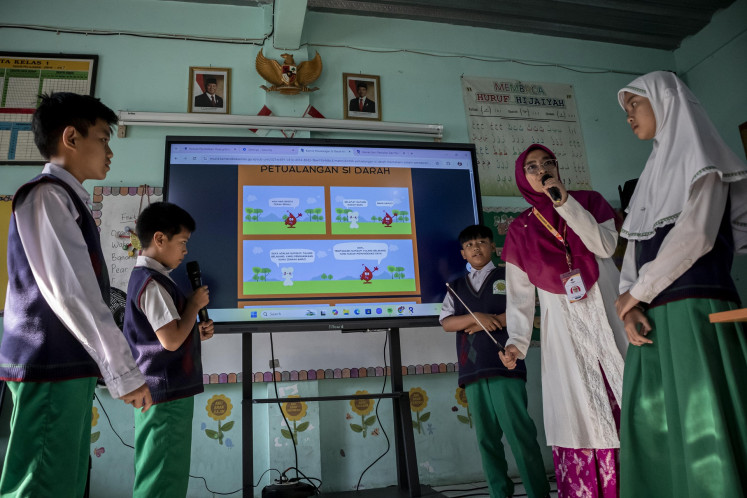SBY boasts success in his 10-year leadership
President Susilo Bambang Yudhoyono highlighted his economic achievements in his last state budget formulation speech on Friday, saying that Indonesia enjoyed its golden era during his 10-year leadership
Change text size
Gift Premium Articles
to Anyone

P
resident Susilo Bambang Yudhoyono highlighted his economic achievements in his last state budget formulation speech on Friday, saying that Indonesia enjoyed its golden era during his 10-year leadership.
'Indonesia no longer sees the process of global economic decision-making from outside or afar; as a member of the G20, we are now engaged in the global economic decision-making,' he told lawmakers. 'To put it simply, Indonesia has become one of the key players in the global economy. There is no reason for Indonesia to be seen as a nation with low self-esteem.'
Indonesia's economic growth averaged 5.9 percent from 2009 to 2013, much higher than the US, Europe, Japan, or other regional peers, he said. The continuous growth in the size of the gross domestic product (GDP) consequently won Indonesia a place in the G20 grouping of the world's biggest economies.
Yudhoyono argued that he played a role in pushing down Indonesia's debt-to-GDP ratio, which once stood at 85 percent in the aftermath of the 1998 financial crisis, to around 23 percent right now.
He also boasted of the fact that the country had settled its debt to the International Monetary Fund (IMF) four years earlier than scheduled.
'One of the moments that I will always remember as President is when I hosted the managing director of the IMF in my own office,' Yudhoyono recalled. 'At that time, it was Indonesia that gave advice as to how to reform the IMF. Indonesia is no longer an IMF patient to whom all economic policies and planning are to be dictated,' he said.
In his speech the President said Indonesia enjoyed a golden period under his two-term administration. He said that Indonesia was given the status during the World Economic Forum in the Philippines early this year. 'Indonesia is lucky to be able to enjoy a golden era during the last 10 years,' he said.
However, Yudhoyono's claims of economic achievement are overshadowed by the recent slump in Indonesia's economic expansion, which contributed to a significant decline in support for his Democratic Party in this year's legislative elections.
Indonesia's GDP growth slowed to its five-year low level of 5.1 percent in the second quarter this year, at a time when its regional peers saw acceleration, such as the 6.4 percent economic growth posted by Malaysia in the same period.
The number of people living in poverty stood at 28.3 million, or 11.25 percent of total population, as of March this year. When campaigning for re-election in 2009, Yudhoyono promised to push down poverty levels to between 8 to 10 percent within five years.
Sluggish progress in poverty alleviation was related to the fact that Indonesia's robust economic growth had been enjoyed mostly by the rich.
The country's Gini coefficient, a measurement of income distribution and inequality, rose to 0.41 percent in 2012 from 0.35 percent in 2005, a year after Yudhoyono first took office.
The rising inequality here occurred when countries such as Thailand, Vietnam and the Philippines have all succeeded in posting strong growth with stable or declining equality, according to the World Bank's latest quarterly report on Indonesia.









